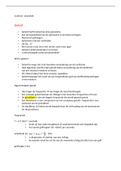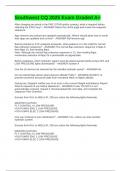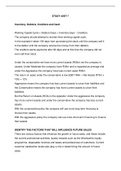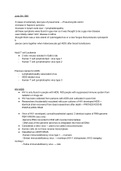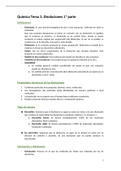Week 1
Ch. 1
1. Both philosophy of science and philosophy of humanities have a double task, viz. a
descriptive task and a normative task (pp. 16-18 Leezenberg 2018). Explain these tasks.
Descriptive: description of scientific practices and products. Normative: normative assessment of practices
and products
Ch. 3
2. What is the problem of demarcation (p. 91)?
The demarcation problem is the philosophical problem of determining what types of hypotheses
should be considered scientific and what types should be considered pseudoscientific or non-scientific.
Induction cannot be justified. The distinction between scientific and non-scientific claims should be
questioned.
The demarcation problem in the philosophy of science and epistemology is about how to
distinguish between science and non-science, including between science, pseudoscience, and
other products of human activity, like art and literature, and beliefs.
3. Logical Empiricism endorsed a verification criterion of meaning (p. 77). Explain
what this criterion entails.
The meaning of a statement consists of the method of its verification: we know what a statement
means when we can point to a method to decide whether it is true of false, for example via experiment.
Verifiability is a necessary condition for qualifying a statement as meaningful.
The statement is literally meaningful (it expresses a proposition) if and only if it is
empirically verifiable.
4. According to Popper, the verification criterion is useless for distinguishing universal laws
from metaphysical statements (p. 90). Explain Popper’s argumentation for this claim.
He thinks this method fails at distinguishing metaphysical from universal laws. For him, questions of
meaning are part of an uninteresting debate of words, and Popper’s interests concerned theories of the
world. A universal law can never really be verified. So when you use the verification criterion you can
never distinguish different sciences: induction problem. Hence, verification is not the solution to the
demarcation problem.
5. Popper endorsed falsifiability as a solution to the problem of demarcation (p. 91). Explain
what this criterion entails.
Falsifiability characterizes science: a theory/hypothesis is formulated in such a way that it can be
rejected based on experience, thus it can be improved in the light of experience.
Like logical empiricism, Popper wants to capture the nature and growth of knowledge.
Popper’s alternative: critical rationalism
- Justification of induction is impossible: all knowledge is hypothetical
6. How does the inductive method of verification differ from the deductive method of
falsification (p. 92)?
The inductive method tries to verify the hypothesis, so this would mean one would go search for white
swans. The falsification method is deductive and tries to falsify the hypotheses, thus looking for black
swans. This to see if the theory should be rejected.
, 7. What is the key difference between an observation sentence (Logical Empiricism)
and a basic sentence (Popper) (p. 94)?
Every observation you make is theory laden. Our observation of how much something is increasing in
speed depends on our previous knowledge of these theories, you have certain conceptions in mind. As
a result, such an observation is said to be theory-laden.
A basic sentence can test a theory. A basic sentence is a potential falsifier of the theory.
Example:
1) Theory: all swans are white
2) Basic sentence: there is at least one black swan
Popper does not see basic sentences as pure statements of observation but as singular
statements that test a theory.
Ch. 4
8. Kuhn distinguished two different meanings of the term paradigm (pp. 118-119).
Which meanings?
1- A textbook example; a model of good scientific practice that is offered to students of a discipline for
exercise and imitation.
2- A paradigm in the broad sense comprises the whole of theoretical and methodological concepts,
convictions, and expectations, including metaphysical presuppositions and scientific values, maintained by a
community of scientists in a particular discipline.
Kuhn focuses on the practice of science rather than the end result
like Popper.
Paradagmic world views heavily theory-laden theories. No neutral-observation sentences can
be used for paradigm.
9. Kuhn’s notion of normal science contradicts Popper’s views on falsification (p. 119).
Explain why this is the case.
He argues that when a theory is falsified, instead of throwing the theory away and making a
new one, you start looking at the measurements, maybe you modify your theory to make it
true again.
Contrary to Popper, he argues that scientists working in normal science do NOT refute their
theories, but – on the contrary - precisely try to elaborate and refine them.
10. Kuhn argued that: “When paradigms enter, as they must, into a debate about
paradigm choice, their role is necessarily circular. Each group uses its own paradigm
in that paradigm’s defense.” (Kuhn 1962, p. 91; quoted in Leezenberg 2018, p. 122).
Explain what Kuhn meant with his claim that the use of one’s own paradigm in defending that
paradigm is circular.
One can only decide to reject a paradigm on the basis of an observation or experiment when
one has already accepted another paradigm qualifying that particular observation or
experiment as decisive.
Paradigm choice/shift:
It’s a frog! Based on my paradigm.
Ch. 1
1. Both philosophy of science and philosophy of humanities have a double task, viz. a
descriptive task and a normative task (pp. 16-18 Leezenberg 2018). Explain these tasks.
Descriptive: description of scientific practices and products. Normative: normative assessment of practices
and products
Ch. 3
2. What is the problem of demarcation (p. 91)?
The demarcation problem is the philosophical problem of determining what types of hypotheses
should be considered scientific and what types should be considered pseudoscientific or non-scientific.
Induction cannot be justified. The distinction between scientific and non-scientific claims should be
questioned.
The demarcation problem in the philosophy of science and epistemology is about how to
distinguish between science and non-science, including between science, pseudoscience, and
other products of human activity, like art and literature, and beliefs.
3. Logical Empiricism endorsed a verification criterion of meaning (p. 77). Explain
what this criterion entails.
The meaning of a statement consists of the method of its verification: we know what a statement
means when we can point to a method to decide whether it is true of false, for example via experiment.
Verifiability is a necessary condition for qualifying a statement as meaningful.
The statement is literally meaningful (it expresses a proposition) if and only if it is
empirically verifiable.
4. According to Popper, the verification criterion is useless for distinguishing universal laws
from metaphysical statements (p. 90). Explain Popper’s argumentation for this claim.
He thinks this method fails at distinguishing metaphysical from universal laws. For him, questions of
meaning are part of an uninteresting debate of words, and Popper’s interests concerned theories of the
world. A universal law can never really be verified. So when you use the verification criterion you can
never distinguish different sciences: induction problem. Hence, verification is not the solution to the
demarcation problem.
5. Popper endorsed falsifiability as a solution to the problem of demarcation (p. 91). Explain
what this criterion entails.
Falsifiability characterizes science: a theory/hypothesis is formulated in such a way that it can be
rejected based on experience, thus it can be improved in the light of experience.
Like logical empiricism, Popper wants to capture the nature and growth of knowledge.
Popper’s alternative: critical rationalism
- Justification of induction is impossible: all knowledge is hypothetical
6. How does the inductive method of verification differ from the deductive method of
falsification (p. 92)?
The inductive method tries to verify the hypothesis, so this would mean one would go search for white
swans. The falsification method is deductive and tries to falsify the hypotheses, thus looking for black
swans. This to see if the theory should be rejected.
, 7. What is the key difference between an observation sentence (Logical Empiricism)
and a basic sentence (Popper) (p. 94)?
Every observation you make is theory laden. Our observation of how much something is increasing in
speed depends on our previous knowledge of these theories, you have certain conceptions in mind. As
a result, such an observation is said to be theory-laden.
A basic sentence can test a theory. A basic sentence is a potential falsifier of the theory.
Example:
1) Theory: all swans are white
2) Basic sentence: there is at least one black swan
Popper does not see basic sentences as pure statements of observation but as singular
statements that test a theory.
Ch. 4
8. Kuhn distinguished two different meanings of the term paradigm (pp. 118-119).
Which meanings?
1- A textbook example; a model of good scientific practice that is offered to students of a discipline for
exercise and imitation.
2- A paradigm in the broad sense comprises the whole of theoretical and methodological concepts,
convictions, and expectations, including metaphysical presuppositions and scientific values, maintained by a
community of scientists in a particular discipline.
Kuhn focuses on the practice of science rather than the end result
like Popper.
Paradagmic world views heavily theory-laden theories. No neutral-observation sentences can
be used for paradigm.
9. Kuhn’s notion of normal science contradicts Popper’s views on falsification (p. 119).
Explain why this is the case.
He argues that when a theory is falsified, instead of throwing the theory away and making a
new one, you start looking at the measurements, maybe you modify your theory to make it
true again.
Contrary to Popper, he argues that scientists working in normal science do NOT refute their
theories, but – on the contrary - precisely try to elaborate and refine them.
10. Kuhn argued that: “When paradigms enter, as they must, into a debate about
paradigm choice, their role is necessarily circular. Each group uses its own paradigm
in that paradigm’s defense.” (Kuhn 1962, p. 91; quoted in Leezenberg 2018, p. 122).
Explain what Kuhn meant with his claim that the use of one’s own paradigm in defending that
paradigm is circular.
One can only decide to reject a paradigm on the basis of an observation or experiment when
one has already accepted another paradigm qualifying that particular observation or
experiment as decisive.
Paradigm choice/shift:
It’s a frog! Based on my paradigm.

